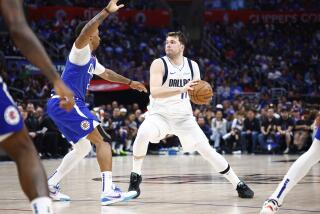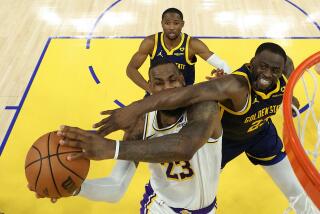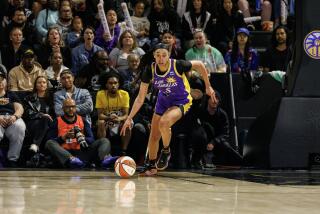NBA players, owners still unable to reach a deal
It’s getting redundant to write, but NBA labor negotiations stopped again without a new deal in place.
The lockout lurched though its 134th day Thursday after an 11-hour bargaining session in New York failed to bear a new collective bargaining agreement between NBA owners and the players’ union.
Owners made a slightly revised offer, but union executives looked less than impressed.
“It’s not the greatest proposal in the world but I have an obligation to at least present it to our membership,” union executive director Billy Hunter said while flanked by a handful of somber players.
No further negotiations were planned between the parties. Player representatives from all 30 NBA teams will meet Monday or Tuesday to mull the latest offer, Hunter said. If they didn’t agree to the deal after that meeting, NBA Commissioner David Stern said the offer would worsen.
“We await the response from the union,” Stern said. “We’ve done our best.”
Stern still envisioned a 72-game season starting Dec. 15, though the union would have to accept the revised proposal next week. Under the new schedule, the playoffs would start a week later than usual and the NBA Finals would also begin a week later.
The parties all but agreed to the all-important 50-50 split of basketball revenue that includes ticket sales and TV deals, but the new owners’ proposal reflects limited progress on key peripheral issues such as luxury taxes and the mid-level exception for free agents.
“I don’t think the revised deal is up to par [for players],” said a prominent agent who had been briefed on the talks.
Even the owners’ side recognized the players’ distaste.
“They told us they were disappointed in the [negotiating] room,” NBA deputy commissioner Adam Silver said. “They do not see these changes as in their self-interest. It’s a reduction in the current system and I know for any union and for any group of employees, that’s something difficult to take.”
Silver said it was important to provide better competitive balance among large-market and small-market teams.
“We believe we will be proven right over time, that this new model, if the players were to agree to it, will create a better league,” Silver said. “It will create one where fans in more markets will be able to hope that their teams can compete for a championship.”
A majority of owners want to create a “repeater tax” for free-spending teams that exceed the luxury tax three times in a five-year period, but players think it would curb spending on their contracts.
The mid-level exception still is a sticky issue, with owners wanting only three-year deals for about $10 million, well below the five-year, $29-million contracts that could be signed last season by middle-of-the-road free agents.
In a surprising estimate, Hunter said there were an additional “30 or 40 issues” he considered important, including the age an amateur player could enter the NBA draft and discipline penalties for players.
The next move for the union could be decertification or the more expeditious “disclaimer of interest.”
Decertification is a complicated process in which the union gets dissolved and players file an anti-trust lawsuit claiming the NBA conspired to deny their ability to market themselves by locking them out.
The National Labor Relations board would be heavily involved in decertification but not a disclaimer of interest.
“The disclaimer hastens the process,” said Bill Gould, a Stanford law professor and former NLRB chairman who wrote the book “Bargaining with Baseball.”
“Whereas a decertification needs an actual filing of a petition to the [NLRB]…a disclaimer would not require any resort to the board. You just make a statement and attach to it whatever evidence you have of lack of support.”
twitter.com/Mike_Bresnahan
twitter.com/BA_Turner
More to Read
Go beyond the scoreboard
Get the latest on L.A.'s teams in the daily Sports Report newsletter.
You may occasionally receive promotional content from the Los Angeles Times.












